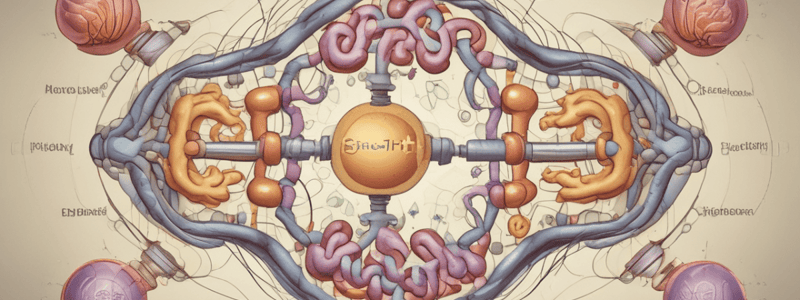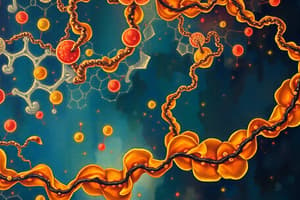Podcast
Questions and Answers
Which protein is primarily responsible for maintaining blood osmotic pressure?
Which protein is primarily responsible for maintaining blood osmotic pressure?
- Globulin
- Albumin (correct)
- Immunoglobulin
- Fibrinogen
What is the primary function of fibrinogen in the blood clotting process?
What is the primary function of fibrinogen in the blood clotting process?
- To activate platelets
- To dissolve existing clots
- To form a clot by converting to fibrin (correct)
- To transport clotting factors
Which of these proteins are involved in the transportation of hormones and other molecules?
Which of these proteins are involved in the transportation of hormones and other molecules?
- Globulin and fibrin
- Fibrinogen and albumin
- Albumin and globulins (correct)
- Immunoglobulin and fibrinogen
What happens to excess amino acids in the body?
What happens to excess amino acids in the body?
What is the role of gluconeogenesis in the context of protein metabolism?
What is the role of gluconeogenesis in the context of protein metabolism?
In what condition does glutamine act as a fuel source for the renal system?
In what condition does glutamine act as a fuel source for the renal system?
What is the primary function of the urea cycle?
What is the primary function of the urea cycle?
Which of the following statements is true about liposomal proteases?
Which of the following statements is true about liposomal proteases?
What is the role of albumin in the body?
What is the role of albumin in the body?
What is the primary function of protein degradation?
What is the primary function of protein degradation?
What is the approximate amount of amino acids in the amino acid pool?
What is the approximate amount of amino acids in the amino acid pool?
What is the role of globulins?
What is the role of globulins?
What is the term for the process by which amino acids are converted to glucose, glycogen, fatty acids, ketone bodies, or CO2 + H2O?
What is the term for the process by which amino acids are converted to glucose, glycogen, fatty acids, ketone bodies, or CO2 + H2O?
What is the term for the collection of intricate molecules found in blood plasma?
What is the term for the collection of intricate molecules found in blood plasma?
What is the percentage of albumin in the blood?
What is the percentage of albumin in the blood?
What is the term for the process by which proteins are constantly being synthesized and then degraded?
What is the term for the process by which proteins are constantly being synthesized and then degraded?
Which of the following is NOT a benefit of Vitamin A?
Which of the following is NOT a benefit of Vitamin A?
Which vitamin is most commonly found in supplements as a standalone?
Which vitamin is most commonly found in supplements as a standalone?
What is the expected market size of the Vitamin A supplement industry by 2024?
What is the expected market size of the Vitamin A supplement industry by 2024?
Which vitamin is responsible for converting carbohydrates into energy?
Which vitamin is responsible for converting carbohydrates into energy?
Which of the following statements is TRUE about the B vitamins?
Which of the following statements is TRUE about the B vitamins?
What is the projected annual growth rate of the B complex vitamin market?
What is the projected annual growth rate of the B complex vitamin market?
Which vitamin is crucial for the production of red blood cells?
Which vitamin is crucial for the production of red blood cells?
Which vitamin is essential for breaking down fats and carbohydrates into energy?
Which vitamin is essential for breaking down fats and carbohydrates into energy?
Which vitamin helps the body create antibodies and hemoglobin?
Which vitamin helps the body create antibodies and hemoglobin?
What is a potential benefit of Vitamin B7?
What is a potential benefit of Vitamin B7?
Which vitamin is essential for metabolizing protein and maintaining a well-functioning central nervous system?
Which vitamin is essential for metabolizing protein and maintaining a well-functioning central nervous system?
What is the main function of Vitamin C?
What is the main function of Vitamin C?
What is the predicted market value of Vitamin D supplements in the next two years?
What is the predicted market value of Vitamin D supplements in the next two years?
What is the function of Vitamin D in the body?
What is the function of Vitamin D in the body?
What type of Vitamin D supplement is recommended?
What type of Vitamin D supplement is recommended?
What is a crucial function of Vitamin E in the body?
What is a crucial function of Vitamin E in the body?
What is the main function of vitamin B6?
What is the main function of vitamin B6?
What are the two groups that vitamins are traditionally separated into?
What are the two groups that vitamins are traditionally separated into?
What is the main function of vitamin A?
What is the main function of vitamin A?
What is the main function of vitamin K?
What is the main function of vitamin K?
What is the main function of vitamin E?
What is the main function of vitamin E?
What is the main function of vitamin C?
What is the main function of vitamin C?
How many essential vitamins are necessary for human health?
How many essential vitamins are necessary for human health?
What is the main function of vitamin D?
What is the main function of vitamin D?
What is the main function of thiamin (Vitamin B1)?
What is the main function of thiamin (Vitamin B1)?
Why do humans need to obtain vitamins from their diet or supplements?
Why do humans need to obtain vitamins from their diet or supplements?
Flashcards are hidden until you start studying
Study Notes
Amino Pool and Nitrogen Metabolism
- Amino pool, approximately 90-100 g, is essential for nitrogen metabolism despite being small compared to total body protein (about 12 kg in a 70-kg male).
- Depleted by:
- Synthesis of body proteins
- Usage as precursors for nitrogen-containing molecules
- Conversion to glucose, glycogen, fatty acids, ketone bodies, or CO2 + H2O.
Protein Turnover
- Most body proteins undergo constant synthesis and degradation to manage abnormal proteins.
- Regulation of synthesis primarily controls protein concentration; however, some proteins are maintained by selective degradation.
Plasma Proteins
- Plasma proteins, primarily synthesized by the liver, play diverse roles.
- Key plasma proteins:
- Albumin: 60% of blood proteins; maintains blood osmotic pressure and electrolyte balance.
- Globulins: Includes alpha, beta, and gamma globulins with various functions such as immune response and transport.
- Alpha globulins: Includes alpha-fetoprotein for cancer markers.
- Beta globulins: Includes transferrin and complement proteins.
- Gamma globulins: Known as immunoglobulins, crucial for immunity.
- Fibrinogen: Essential for blood clot formation, converted to fibrin during clotting.
Functions of Plasma Proteins
- Maintains blood osmotic pressure via albumin.
- Globulins and albumin transport hormones, enzymes, and molecules.
- Fibrinogen plays a primary role in blood clot formation.
- Some globulins, including immunoglobulins, are vital for immune function.
Hormonal Regulation of Protein Metabolism
- Proteins undergo catabolism to replenish the intracellular amino acid pool.
- In starvation, muscle protein breakdown provides amino acids for gluconeogenesis, serving as an energy source.
- Excess amino acids can be converted to glucose, ketones, or decomposed, producing nitrogenous waste that is processed through the urea cycle.
Functions and Importance of Vitamins
- There are 13 essential vitamins necessary for human health, divided into water-soluble and fat-soluble categories.
- Vitamins cannot usually be synthesized by the body in sufficient amounts and must be obtained through diet or supplements.
Water-Soluble Vitamins
- Vitamin B1 (Thiamine): Vital for carbohydrate metabolism and nerve function; deficiency leads to nerve impairment.
- Vitamin B2 (Riboflavin): Assists in energy production and lipid metabolism; deficiency causes skin and ocular issues.
- Vitamin B3 (Niacin): Important for metabolism and digestion; deficiency causes skin lesions and gastrointestinal issues.
- Vitamin B6: Key for amino acid metabolism and synthesis of hemoglobin; deficiency results in depression and anemia.
- Folic Acid (B9): Crucial for DNA synthesis and red blood cell maturation; deficiency leads to weakness and developmental issues in fetuses.
- Vitamin B12: Necessary for amino acid and fatty acid metabolism; deficiency causes gastrointestinal and nervous problems.
- Pantothenic Acid: Essential for carbohydrate, protein, and fat metabolism; deficiency includes weakness and sleep disturbances.
- Biotin: A cofactor in various metabolic processes; deficiency can cause dermatitis and hair loss.
- Vitamin C: Acts as an antioxidant and is vital for collagen synthesis and immune function; deficiency leads to poor wound healing and gum issues.
Fat-Soluble Vitamins
- Vitamin A: Essential for vision, skin health, growth, and immune response; deficiency can cause blindness and infection vulnerability.
- Vitamin D: Maintains calcium and phosphorus levels, supporting bone health; deficiency leads to improper bone growth.
- Vitamin E: Functions as an antioxidant and protects cell membranes; deficiency may result in peripheral neuropathy.
- Vitamin K: Important for blood coagulation and bone metabolism; deficiency causes impaired clotting.
Vitamin Supplementation Trends
- Vitamin A supplement market projected to exceed $860 million by 2024.
- B Vitamins are popular and often taken as a complex for synergistic effects.
- Vitamin C is a widely consumed supplement, with the market expected to generate approximately $9.8 billion by 2022.
- Vitamin D supplements, crucial for aging populations, are projected to reach $2.5 billion in sales.
Studying That Suits You
Use AI to generate personalized quizzes and flashcards to suit your learning preferences.




